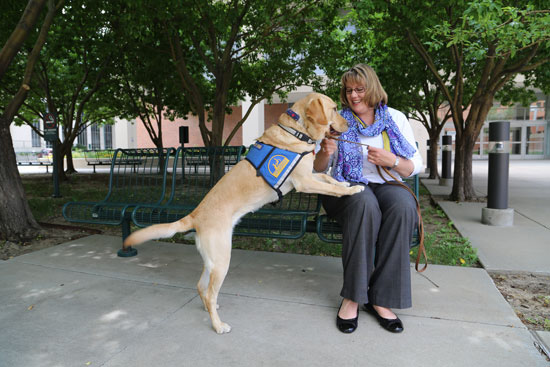By Bonnie Campo, News21
She rarely barks, but she always wags her tail as she enters some of the most difficult and darkened doorways of the Veterans Affairs Eastern Colorado Health Care System.

Elizabeth Holman demonstrates Waffle’s ability to lean against patients on command, which Holman says brings comfort to PTSD patients at Denver’s VA Medical Center. (Photo by Jake Stein, News21)
Waffle comes from a high pedigree of Labrador retrievers, but more importantly, she is the secondary caretaker for terminally ill veterans who are fighting their last battles. The 2-year-old pup also assists veterans who are newly returned home, those who have conditions such as post-traumatic stress disorder, and some who are just seeking a smile.
Waffle’s skill set includes responses to approximately 50 commands that range from her giving high-fives to opening doors for the disabled. Her handler, Elizabeth Holman, has worked four years for the Denver VA. Holman, a clinical psychologist, delivers palliative care, which focuses mainly on pain and stress.
Waffle offers an avenue for others to speak about their ailments, Holman said. She “can’t even imagine” what her practice would be like without Waffle, Holman said.
Dogs provide comfort, but they are no substitute for established PTSD treatment, according to the National Center of Post-Traumatic Stress Disorder, a division of the U.S. Department of Veterans Affairs.

Waffle quietly rests beside Elizabeth Holman in front of Denver’s VA Medical Center. (Photo by Jake Stein, News21)
“Although people with PTSD who have a service dog or emotional support dog may feel comforted by the animal, there is some chance he or she may continue to believe that they cannot do certain things on their own,” according to the VA Center website. “Depending on a dog can get in the way of the recovery process for PTSD.”
Even though most veterans are on medications, this treatment is an alternative that Holman said seems to be working, especially for those who are seeking some immediate relief.
Holman cited studies that report simply petting an animal lowers patients’ blood pressure and stress.
“This is her mission,” Holman said.
Holman thinks that some wounded veterans cannot speak comfortably to doctors — who must continuously jot notes and make personal assessments — as they might interact with an animal, she said.
Waffle came from the Canine Companions program and has provided therapy since February. She already is greeted like a celebrity in about every room she enters.
“We didn’t name her, but someone said that it fits her because she melts the veterans heart like butter,” Holman said.
It is too soon to have a clear evidence base to prove whether therapy dogs are an effective treatment, according to the national PTSD Center website, but Holman said she can see the difference in her patients.
For now Waffle’s four paws will continue to march hallways in the hospital, dispensing happiness to new and old faces.
